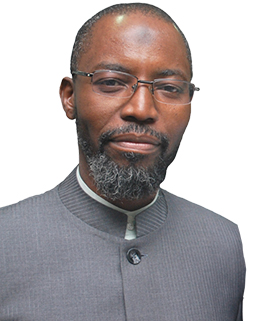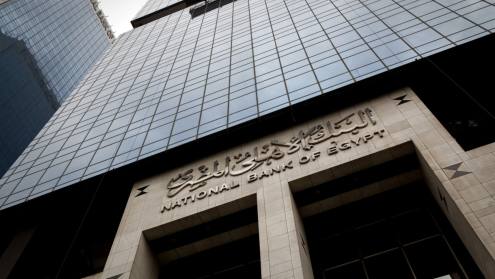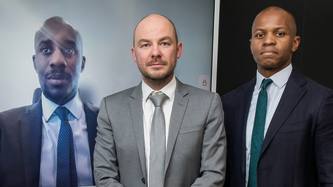Q: The International Monetary Fund forecasts that Nigeria’s economy will contract by 5.4% in 2020 due to the impact of the coronavirus and lower oil prices. What are your predictions for the banking sector?
A: I’d say the main impact of Covid-19 on the banking sector will not be felt immediately in 2020. For sure, activity has slowed down a lot in the past four months or so, but I think that we will not see a very significant decline in banks’ balance sheets or perhaps even profitability this year.
Nigeria is a mono-economy [that is, reliant on oil revenues] and oil has taken a big hit over the past quarter and beyond. So what’s happening in the Nigerian economy is definitely going to affect banks. But I suspect the impact will be felt more in 2021 than in 2020.
Q: The Central Bank of Nigeria weakened the naira in March and July of this year, following the impact of the pandemic on the economy. How will this impact the banks?
A: If the devaluation results in a more uniform exchange rate that encourages more transparency and liquidity in the market, it’s definitely something to be welcomed. Liquidity is what we’ve been lacking, which affects the capacity of financial institutions to even meet their corresponding banking obligations on time.
I think it’s definitely a step in the right direction if it helps ensure there is uniformity in exchange rates, which in turn will benefit the private sector. It will especially benefit those in the private sector that are liquid in dollars to participate more in the market, and thus make more foreign currency available for banks and other institutions that like to interact and trade.
Q: Nigeria has a Muslim population of more than 100 million, which is more than any country in the Middle East and Africa, but Islamic finance still makes up a tiny proportion of the country’s financial sector. Are there any signs of this changing?
A: It’s true that with the size of the Muslim population in Nigeria you’d imagine that Islamic finance would have grown significantly more than it has done so far.
Jaiz Bank has been the pioneer in this sector when it became the country’s first non-interest Islamic bank. When we entered the market in 2013 there were no [Islamic] instruments to invest liquidity into, and no counterparties to deal with. We had to wait until 2017 for Nigeria’s first sovereign sukuk issuance. Following that there was another sukuk issued in 2018, and we had to wait until June 2020 for the third.
The period since the first sukuk issuance has seen our business significantly increase. At the end of 2015 the size of our balance sheet was just N52bn ($136m); by the close of 2019 this had more than tripled to N160.2bn.
The three sovereign sukuk issuances have been very significant to our operations. Prior to the issuances, it was tough to maintain our liquidity levels and add income and attract deposits – the raw material a bank needs to operate – so the situation wasn’t ideal or optimal.
It is only in the past year that we have another non-interest Islamic bank that has joined the system [TajBank, which was licensed in June 2019, began operating in December 2019]. We are now growing more than 30% year-on-year; so I believe with more Islamic instruments and infrastructure, and now with more counterparties to trade with, it’s gotten to the point where there will be a blossoming of the Islamic banking market.
More importantly, what we’re doing is helping more and more people become financially included for the first time. When you look at the north of Nigeria, which has a population of more than 100 million – 40-50% of whom are not financially included – you can see the potential if you empower these people.
Q: In recent years there has been increased interest in the role of Islamic finance tools in financing development projects under the UN’s Sustainable Development Goals (SDG), and the increasing overlap with mainstream environmental, social and governance investing. What are the key features of Islamic finance that encourage such overlaps?
A: One of the most important principles of the Islamic faith and [sharia] law, which underscores Islamic finance, is ensuring the wellbeing of the people. In addition, there are a number of specific features of Islamic finance – such as the zakat taxation system and the way commercial transactions are structured – that are specifically designed to ensure there is a distribution [of wealth] to less fortunate members of society.
When such features are scaled up, it can lead to the gradual elimination of hunger, poverty and financial inequality.
On the environmental side, it is a core principle of Islamic finance to not invest in activities that are deemed to be harmful to a society, which is a very large umbrella. So for example, activities that will destroy some elements of the environment and adversely distort the balance of an ecosystem would not be financed by an Islamic finance institution.
When you add all these factors together, Islamic finance shares a lot with the UN’s SDG programme, which has been widely accepted internationally as a framework for building a better world.
Q: What initiatives has Jaiz Bank launched that overlap with the UN’s SDG programme?
A: So far we’ve focused our efforts in areas such as the reduction of poverty, the elimination of hunger, empowering women, reducing inequality, while at the same time looking at environmental interventions in the form of a recycling programme.
In the area of poverty alleviation and the empowerment of women, in 2018 we launched the Jaiz Financial Inclusion Centre programme for women entrepreneurs in rural areas. With this programme we have been able to reduce poverty, boost financial inclusion and empower women, bringing in equality.
Under the programme we provide them with some basic financial training, and with microcredit to help them grow and enhance their businesses. To date we’ve enrolled over 2000 women in the programme; we’ve wanted to expand it further but the coronavirus outbreak has held it back.
The programme has been successful thus far. It’s had a positive impact on the women participating, but has also proved to be sustainable financially, with very few defaults. After the initial phase, we’ve also been able to expand the programme by increasing the financing available and giving the participants access to micro takaful [Islamic insurance] programmes. If you know Nigeria you’ll know this is significant, as insurance penetration is very low, even in urban areas. We’re also intending to begin offering micro health insurance products very soon.
Around 60% of the population in Nigeria is financially excluded and are unattractive customer prospects for conventional banks. So providing such people with such financial services is very exciting for us, as it brings them into the financial system for the first time.
We’re also supporting the One Farmer One Hectare programme in collaboration with [German aid group] GIZ, which connects into the Nigerian government’s strategy to make the country self-sufficient in growing rice. Not only are we providing finance to farmers, but we are also helping them adopt modern farming techniques to be able to enhance productivity. The average previous yield was about two tonnes per hectare, which is a very low figure. We’ve helped participating farmers increase their yields to between five and seven tonnes per hectare.
This programme has helped farmers increase their income, which means they have more capacity to support their families in their education and also help Nigeria become more self-sufficient in this important commodity.













